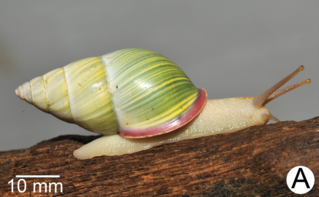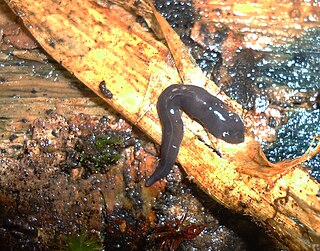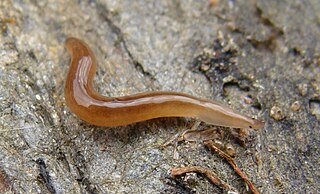
Birth is the act or process of bearing or bringing forth offspring, also referred to in technical contexts as parturition. In mammals, the process is initiated by hormones which cause the muscular walls of the uterus to contract, expelling the fetus at a developmental stage when it is ready to feed and breathe.
Auricle is an Anglicization of Latin auricula, from auris 'ear' and -cula, a diminutive suffix.

The Kerry slug or Kerry spotted slug is a species of terrestrial, pulmonate, gastropod mollusc. It is a medium-to-large sized, air-breathing land slug in the family of roundback slugs, Arionidae.

Amphidromus is a genus of tropical air-breathing land snails, terrestrial pulmonate gastropod mollusks in the family Camaenidae. The shells of Amphidromus are relatively large, from 25 mm (0.98 in) to 75 mm (3.0 in) in maximum dimension, and particularly colorful. During the 18th century, they were among the first Indonesian land snail shells brought to Europe by travelers and explorers. Since then, the genus has been extensively studied: several comprehensive monographs and catalogs were authored by naturalists and zoologists during the time period from the early 19th to the mid 20th centuries. Modern studies have focused on better understanding the evolutionary relationships within the group, as well as solving taxonomic problems.

Tandonia is a genus of air-breathing, keeled, land slugs. These are shell-less terrestrial gastropod mollusks in the family Milacidae.

Dugesiidae is a family of freshwater planarians distributed worldwide. The type genus is Dugesia Girard, 1850.

Microplana is a genus of land planarians found in Europe and Africa.

Obama is a genus of land planarians from South America. It contains several species adapted to human-disturbed environments, including the only invasive land planarian native to the Neotropical realm, Obama nungara, which has been accidentally introduced in Europe.

The reproductive system of planarians is broadly similar among different families, although the associated structures can vary in complexity.

Notogynaphallia is a genus of land planarians from South America.

Rhynchodemini is a tribe of land planarians in the subfamily Rhynchodeminae.

Amaga is a genus of land planarians from South America.

Bogga is a genus of land planarians from South America. It is monotypic, being represented by the single species, Bogga bogotensis, which occurs in Bogotá, Colombia.
Gigantea is a genus of land planarians from the Neotropical realm.

Rhynchodemus is a genus of land planarians in the tribe Rhynchodemini.
Cotyloplana is a genus of land planarians in the tribe Rhynchodemini.

Humbertium is a genus of land planarians of the subfamily Bipaliinae.
Beauchampius is a genus of land planarians in the tribe Pelmatoplaninini.
Pelmatoplana is a genus of land planarians in the tribe Pelmatoplanini.

Microcotyle visa is a species of monogenean, parasitic on the gills of a marine fish. It belongs to the family Microcotylidae.














